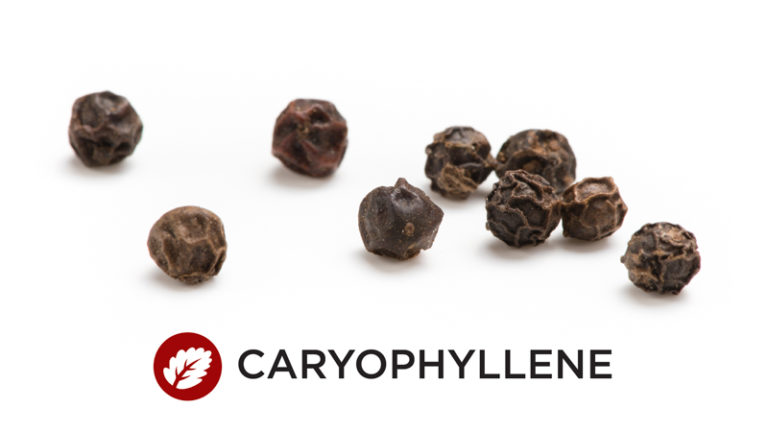 Photo by: Gina Coleman/Weedmaps
Photo by: Gina Coleman/WeedmapsImage lightbox

Caryophyllene, more formally known as beta or b caryophyllene, is an extremely common terpene found in cannabis that is known for its herbal spiciness with hints of wood. It is most commonly found in black pepper, cinnamon, and hops. Caryophyllene is a potent component in anti-inflammatory salves and topicals and also has potential anticancer, antibacterial, antifungal, and antiseptic properties. Caryophyllene is unique because of its ability to bind to CB2 cannabinoid receptors in the endocannabinoid system after being consumed orally.
What is caryophyllene?
Notable as a dietary cannabinoid, the caryophyllene terpene is a frequent natural food additive. Shaded pale yellow, caryophyllene has a sweet taste found in such food items as allspice and fig. Caryophyllene is one of the most thoroughly studied terpenes found in cannabis. Organic chemist and Harvard researcher E. J. Corey studied caryophyllene in the 1960s and demonstrated the terpene's unique properties. Corey's pioneering research has aided contemporary scientists investigating caryophyllene's potentially therapeutic uses.
What is caryophyllene used for?
Anyone with an affinity for spicy cooking has probably come in contact with caryophyllene at some point. Dishes from cinnamon French toast to pepper steak may contain caryophyllene. Additionally, caryophyllene has preservative properties and is found in the hops that flavor and stabilize beer. Although beer is the most widely known beverage to contain hops, it is not the only one. Hops, and therefore caryophyllene, may be found in certain types of vodka and “hopped” whiskeys. Caryophyllene has also been used as a flavoring agent in chewing gum to enhance a citrusy or spicy flavor profile. The terpene may be found in detergents and numerous topical skin products.
What does caryophyllene smell like?
Caryophyllene has a strong, spicy, peppery scent, which it lends to essential oils with similar aroma profiles. Clove, basil, ylang ylang, rosemary, and black caraway are examples of caryophyllene-rich essential oils. Clove essential oil is notable for its numbing effect on pain, notably toothaches. Ylang-ylang essential oil, derived from a tropical tree native to India, is often integrated into perfumes as well as used in religious ceremonies in parts of Asia.
Therapeutic properties of caryophyllene
Much promising research has been conducted on animals to uncover various caryophyllene effects, most notably its possible therapeutic usages. However, more research is needed to understand this terpene's effects on human health, both physical and mental. One notable 2015 study, conducted on human cells and published in the journal Molecules, demonstrated caryophyllene's potential as an anticancer, antimicrobial, and antioxidant agent. Although these findings are very promising, further research in humans is necessary to fully define the best medical uses for caryophyllene.
Anti-inflammatory
Caryophyllene has been shown to have possible anti-inflammatory effects in ailments such as arthritis. One study, published in 2018 in the British Journal of Pharmacology, observed the response rate of the terpene's anti-inflammatory properties in rats with induced arthritis. Researchers discovered that doses of 215 milligrams and 430 mg of caryophyllene given to both healthy and arthritic rats reduced the swelling of lymph nodes and did not modify the metabolism of the healthy rats.
Anticancer
Citing the need for further research, scientists have nonetheless hailed caryophyllene as reducing the growth and proliferation of cancer cells as well as enhancing the effectiveness of some cancer treatments according to a 2016 study published in the journal Cancer Medicine.
Sleep
In combination with other terpenes, caryophyllene has shown promise as a sedative. A 2012 study published in the journal Pharmaceutical Biology found that mice treated with essential oil containing caryophyllene experienced increased sleep time as well as decreased locomotion and body temperature.
Pain
A 2013 study published in the European Journal of Pain found that when mice exposed to capsaicin were injected with caryophyllene, they experienced pain relief. The terpene was also found to enhance the pain-relieving properties of low doses of morphine.
Diabetes
When it comes to other potential beta-caryophyllene benefits, there is evidence indicating that the terpene, along with standard diabetic medicine, helps balance glucose levels in rats with diabetes, according to a 2014 study published in the journal Acta Histochemica.
Anxiety
There may be an exhaustive list of terpenes with the potential to ease anxiety, but caryophyllene, limonene, and myrcene are notable among them. Caryophyllene, in particular, was found in a 2014 study on mice to have therapeutic effects on anxiety and depression. The researchers, whose findings were published in the journal Physiology & Behavior, concluded that "the possibility that beta-caryophyllene may ameliorate the symptoms of these mood disorders offers exciting prospects for future studies."
In addition, a 2016 study conducted on rats and published in the journal Molecular and Cellular Biochemistry showed that caryophyllene's antioxidant and anti-inflammatory effects could potentially help with Parkinson's disease. In a 2014 study published in the journal Pharmacology, caryophyllene was shown to reduce neuroinflammatory response in a mouse model of Alzheimer's disease.
Role of caryophyllene in cannabis
Cannabis varieties that contain high concentrations of beta-caryophyllene include Bubba Kush, OG Kush, Chemdawg, Sour Diesel, Rockstar, and Skywalker OG. Fun fact: most cannabis strains will likely contain some caryophyllene.
High-caryophyllene cannabis strains are generally perceived to have a pain-relieving effect as a direct result of inflammation reduction. Because of caryophyllene's binding affinity for CB2 receptors in the brain, the terpene may also have effects on short-term and long-term brain health and mental well-being. Caryophyllene can be found in many cannabis topicals and salves.
Bottom line
Caryophyllene, also known by its more scientific name beta-caryophyllene, is frequently encountered in the culinary world and cannabis and may be beneficial in treating inflammation.
Major contributions from Dr. Adie Rae.

